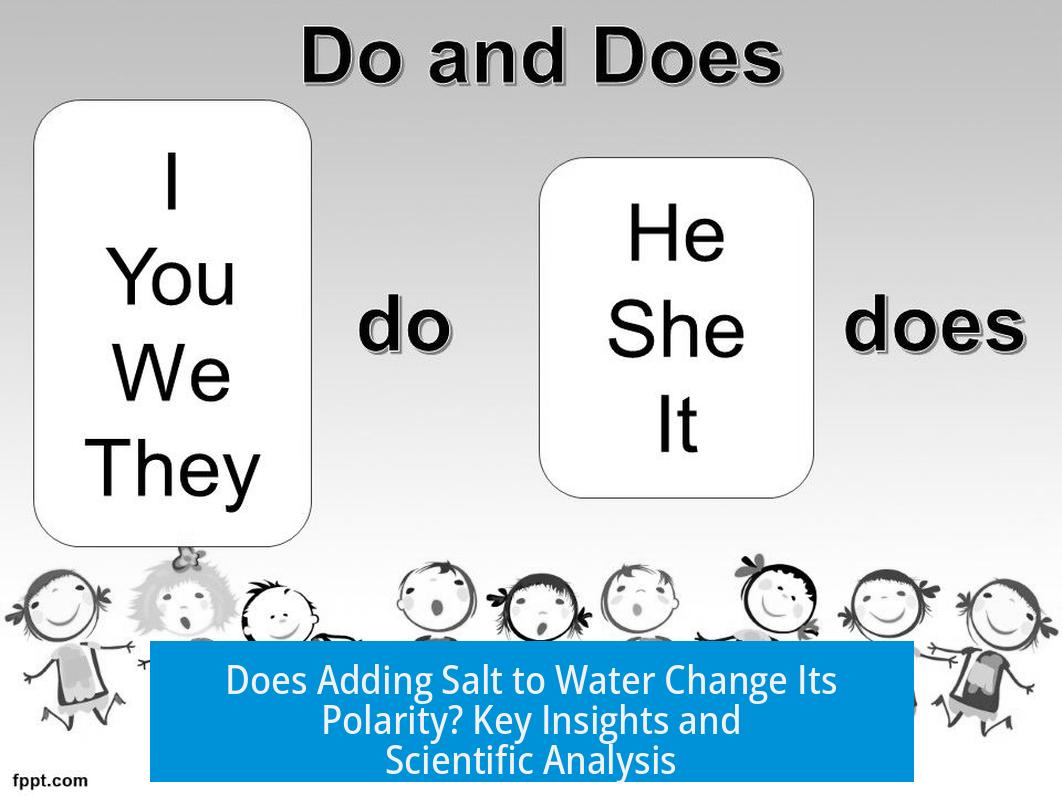Does Adding Salt to Water Change Its Polarity?
Adding salt to water alters the overall polarity of the solution but does not fundamentally change the polarity of individual water molecules. The bulk properties of water, such as its dielectric constant, decline with salt addition, showing a change in collective polarity. However, the intrinsic polar nature of each water molecule remains intact.
Water Molecules and Ion Interaction
When salt dissolves in water, its ions (Na+ and Cl−) become surrounded by water molecules. Each water molecule reorients its dipole to coordinate with these ions, creating a solvation shell. This interaction is primarily electrostatic, involving attraction between water’s dipoles and salt ions.
This solvation effect doesn’t remove or reverse the polarity of individual water molecules. Instead, it organizes them around ions, influencing the structure of the solution on a microscopic scale.
Electrostatic Interactions vs. Electron Density
Basic chemistry explains ion-water interaction as electrostatic attraction—oppositely charged entities drawing near. Advanced perspectives consider electron density shifts within water molecules near ions. This slight redistribution can modify the polarization of those molecules but does not eliminate their intrinsic dipole moment.
Impact on Dielectric Constant
The dielectric constant measures how well a medium reduces the effective electric field between charges, serving as a proxy for polarity at the macroscopic level.
| Condition | Dielectric Constant (Approx.) |
|---|---|
| Pure water (25°C) | ~78.5 |
| Water + high salt concentration | Lower than 78.5 |
Adding salt reduces this dielectric constant, indicating that the solution’s net ability to respond to electric fields decreases. This reflects altered collective polarity resulting from the structured arrangement and restricted movement of water molecules around ions.
Clarifying the Conflicting Views
- Individual water molecules stay polar regardless of salt presence.
- The overall polarity seen in bulk measurements decreases as ions distort the hydrogen bonding network.
- This leads to nuanced answers: salt changes polarity at the solution level but not at the molecule level.
Additional Considerations
High salt concentrations impact biological processes, such as enzymatic activity, by affecting sites through ionic strength changes. This effect is independent of polarity changes, emphasizing that salt addition influences more than just polarity.
Key Takeaways
- Adding salt does not change the inherent polarity of individual water molecules.
- Salt ions cause water molecules to form solvation shells via electrostatic interactions.
- The dielectric constant of water decreases with salt, indicating altered bulk polarity.
- Changes are more about collective behavior than molecule-level polarity.
- Salt effects extend beyond polarity, influencing biological and chemical processes.
Does adding salt to water change the polarity of individual water molecules?
No, the polarity of individual water molecules stays the same. Salt ions attract water molecules and form a solvation shell, but this does not alter each molecule’s inherent polarity.
How does salt affect the overall polarity of water?
Adding salt changes the bulk properties of water by reducing its dielectric constant. This means the overall polarity behavior of the solution changes, although individual molecules remain polar.
What role do electrostatic interactions play when salt dissolves in water?
Salt ions interact electrostatically with the dipoles of water molecules. This interaction creates a structured arrangement, called a solvation shell, around the ions without changing water’s molecular polarity.
Is the change in polarity due to electron density transfer between salt ions and water?
More advanced theories suggest some electron density shifts occur, slightly affecting molecular polarization. However, this effect is very subtle and mostly relevant in detailed chemical models.
Can the presence of salt influence biochemical reactions by changing water’s polarity?
High salt concentrations can slow enzymatic activities by interfering with binding sites, but this effect is not directly caused by changes in water polarity.





Leave a Comment